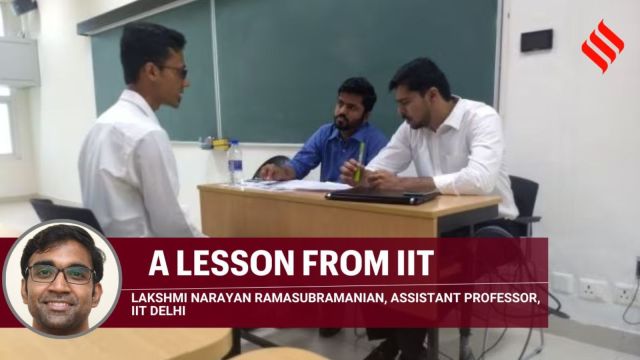© IE Online Media Services Pvt Ltd
Latest Comment
Post Comment
Read Comments
 A Lesson from IIT: Should IITians concentrate on package or skills? IIT Delhi professor answers.
A Lesson from IIT: Should IITians concentrate on package or skills? IIT Delhi professor answers.— Lakshmi Narayan Ramasubramanian
One of the prominent conversations these days is the absence of some big companies in the placement season at IITs. While many have attributed this to the onset of a global recession, there are some other factors as well.
From an undergraduate (UG) engineering student’s point of view, jobs in the information technology (IT) industry, which have the maximum monetary reward-to-effort ratio, are most attractive. Intending to secure a job in IT, most UG students, including those enrolled in Civil, Materials, Chemical and Mechanical engineering in IITs and NITs, focus their efforts on acquiring computer programming skills and often ignore their discipline-specific curricula. The primary aim of students from the above-mentioned disciplines is to secure a job in companies like Amazon, Google or Microsoft along with their computer science engineering peers.
Although some UG students, across these disciplines, become highly skilled in computer programming, most are unable to adapt to the steep learning curve associated with it and are, at best, low-to-medium skill level programmers.
In recent times, with the emergence of artificial intelligence (AI) tools that can efficiently write pieces of code, companies want to only hire developers who possess advanced coding abilities as the work of low-to-medium skill level programmers can now be performed by AI tools. By the time most non-computer science students realise this and want to get back to studying what their disciplines offer, they are already in their sixth semester and feel that it is too late for them to acquire the required domain knowledge for jobs in their disciplines. Consequently, students often find it difficult to cope with academic pressure at engineering institutions and blame their respective disciplines for providing few job opportunities.
While high paying job opportunities are indeed limited in non-circuit branches of engineering — a topic which needs to be discussed separately — the argument undermines the fact that the student has not tried to acquire appropriate skills for the discipline-specific job in the first place. Another knee-jerk reaction of students failing to acquire top-tier IT skills is to engage themselves in extracurricular, sports and event management activities, in the hope that data analytics, product management or consulting companies will applaud their all-round abilities and hire them for managerial jobs. Besides the fact that such managerial jobs are limited in terms of availability and growth prospects, most students joining these firms realise that these jobs are not sufficiently stimulating.
If one were to analyse the entire cycle of a UG student, it becomes evident that students are engaging in outcome-oriented learning. In this paradigm, the student only cares if he has sufficient mental ammunition to clear several rounds of job interviews. It is likely that students naturally gravitate towards this form of learning as it mirrors the process of preparing for competitive exams, such as JEE Advanced, which they cracked to enter these elite institutions. Unfortunately, courses in degree programmes of engineering institutes, such as IITs, cater to process-based learning, where the student has to connect the dots across courses and develop a knack in their field of study. In the process-based learning paradigm, some broad topics are introduced to students, who are then expected to introspect and dig deeper to discover subtler concepts and ideas.
What most students do not realise is that process-based learning enhances their mental abilities and offers many more career options than what outcome-based learning can provide. For instance, when the chips are down in the job market, students must be prepared to engage in higher studies, which is adequately supplemented by process-based learning. In some ways, the concept of process-based learning aligns with the age-old tenet adapted from the Bhagavad Gita, ‘karm karo aur phal iccha mat karo’, which roughly translates to ‘focus on the process and not on the outcome’. Such truths will remain eternal and are applicable to all aspects of our lives, including engineering education.
(The writer is assistant professor, Department of Materials Science and Engineering, IIT Delhi)
(A Lesson from IIT is a weekly column by an IIT faculty member on learning, science and technology on campus and beyond. The column appears every Friday)